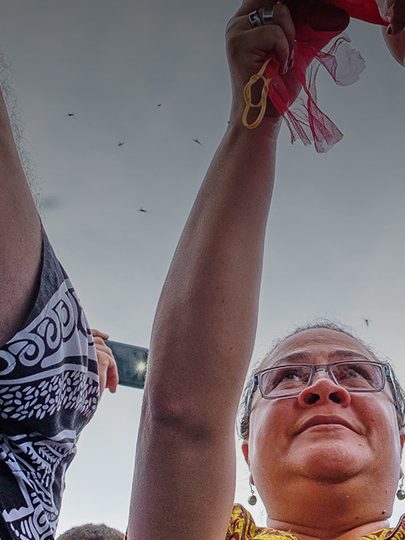

Macquarie 50th Anniversary Award
The World Mosquito Program’s vision is for a world where everyone can live a healthy life – free from the fear and suffering caused by mosquito-borne diseases like dengue, Zika, chikungunya and yellow fever.
involved in WMP projects1
from dengue1
developed for scaling Wolbachia releases1
Over the past five years, the World Mosquito Program (WMP) has refined on the development, testing and monitoring of the groundbreaking Wolbachia method, a safe and effective approach to reducing the transmission of certain mosquito-borne diseases.
WMP has trialled new technologies for Wolbachia mosquito production and releases, including:
With the support of Macquarie Group, WMP has initiated projects in four new countries: Laos, El Salvador, Timor-Leste, and Honduras and expanded Wolbachia releases in Cali, Colombia.
Our grant also supported WMP in developing a knowledge-sharing platform to help train country partners and local teams on Wolbachia mosquito rearing and release methodology.
The Macquarie 50th Anniversary Award has also supported ongoing monitoring of the effectiveness of Wolbachia releases across multiple sites, from Australia to New Caledonia to Vietnam.
Since winning the Macquarie 50th Anniversary Award in 2019, WMP has raised an additional $A30.4 million in funding to further scale-up Wolbachia mosquito releases.1
Over the past five years we’ve been focused on scaling our operations so we can protect more people. We were able to leverage the initial funding from Macquarie Group Foundation to help advance projects in new locations.”
Scott O'Neill
Chief Executive Officer
World Mosquito Program
Monash University’s World Mosquito Program takes a bold approach to protect global communities from mosquito-borne diseases. In this video, we hear from Ms Bani, who has championed the program’s life-changing work in her own community in Kricak Village, Indonesia.
In FY2024, positive results from the World Mosquito Program's (WMP) pilot mosquito community releases in Vientiane, Laos, prompted new private and public sector investment to enable roll-out for the remaining areas of the city, along with urban areas in four additional provinces. The first mosquito releases in El Salvador commenced, and Wolbachia prevalence in Cali, Colombia exceeded 50 per cent in the majority of release areas. Many of the Wolbachia intervention communities have reported low dengue case numbers despite high incidence rates in surrounding cities.
In FY2023, the WMP commenced operations in Laos, Honduras and El Salvador, and undertook preliminary discussions with the Timor-Leste Government around establishing a WMP presence there. WMP also scaled up mosquito releases in Cali, Colombia, supported by active community participation.
In FY2022, Monash University’s WMP announced that its technology had now reached more than 10 million people, and in so doing, it is predicted to have already averted more than 300,000 dengue cases and more than 20,000 hospitalisations in the areas where the technology has been deployed.1
In FY2021, the WMP conducted a study to measure the efficacy of the Wolbachia method through a randomised controlled trial in Yogyakarta City, Indonesia. The study showed a 77 per cent reduction in dengue incidence and an 86 per cent reduction in dengue hospitalisations in Wolbachia-treated areas compared with untreated areas.1